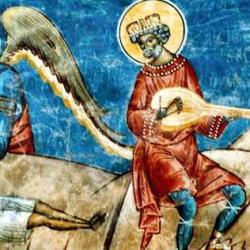Psalm 25:14 says that “the secret of Yahweh is for those who fear Him, and His covenant He will cause them to know.” The parallel structure of the verse indicates that “secret” and “covenant” are describing the same reality, and the parallel comes out more strongly in the Hebrew since the phrases “to those who fear Him” and “to cause them to know” (Hiphil infinitive of yada’ ) are grammatically parallel constructions, an aspect of the verse that is hard to render in English.
Thus, there is a double parallel, first between “secret” and “covenant” and secondly between “fear” and “knowledge.” The latter connection is well-known from the Proverbs, which insist that the fear of Yahweh is the beginning of wisdom and knowledge. But the parallel of “secret” and “covenant” is unusual and revealing.
The word for “secret” is sod , and it is used in several passages to describe either a) an intimate conversation or secret plans or b) a circle of confidants, conversation partners, or friends who are told about plans. According to the Theological Wordbook of the Old Testament , the word differs from other words for counsel or advice by its emphasis on confidentiality.
Amos 3:7 states that Yahweh reveals His “secret counsel” to the prophets (cf. Gen 18); the word here means something like “plans that are not yet revealed or accomplished.” The wicked conspire to make “secret plans” against the righteous (Ps 83:3). Jacob condemns Simeon and Levi for their violence, and says that his soul “will not enter into their secret plans” (Gen 49:6). Proverbs repeatedly warns against associating with one who would “reveal secrets” (Pr 11:13; 20:19; 25:9).
David complains about a treacherous friend, who turns against him after they had “had sweet counsel together, walked in the house of God in the throng” (Psalm 55:14 [Heb, v 15]), apparently using the word not only to describe the intimacy of their fellowship, but the company or circle of intimate friends and fellow worshipers of Yahweh. Job also uses the word in describing a circle of friends, complaining that all the “men of my secret counsel” have turned against him (Job 19:19). The assembly of worshipers at the temple is described as “the sod of the upright” in Psalm 111:1, where the word stands in parallelism to ‘edah (“assembly”).
The TWOT summarizes some of the other uses: “The wise and upright man who walks in the fear of the Lord will have God’s secret counsel . . . . He will associate himself with others who likewise fear God (Ps 89:7 [H 8]) and sing his praises (Ps 111:1). He will dissociate himself from evildoers (Gen 49:6; Jer 15:17) and pray for deliverance from their evil machinations (Ps 64:2 [H 3]). God himself will oppose wicked councils (Jer 23:18-22) and pour out his wrath upon their members (Jer 6:11) so that they have no place among the assembly of the righteous (Ezk 13:9)” ( TWOT , vol. 2, p. 619).
Looking back at Psalm 25:14, we may draw out several lines of consideration. First, the Psalm might be indicating the connection between being in covenant and being given access to the prophetic council of Yahweh. The “secret counsel” is what Yahweh reveals to His prophets (Amos 3:7), and this is identified in Psalm 25 as the covenant itself. This makes sense in the case of Abraham, who is both recipient of the covenant promise and the first prophet in Scripture, to whom Yahweh reveals His plans to destroy Sodom. Second, the Psalm, and the use of the word in the OT generally, offers some suggestive insight of a kind of sociological nature. The word is used both of the “council of intimates” who are associated with Yahweh and the conspirators who develop secret plans against the righteous. We can hypothesize that membership in some “secret council” is a baseline human desire, the desire that C.S. Lewis described as the desire to enter the “Inner Ring.” If so, the proliferation of conspiracies and conspiracy theories in the modern world might be seen as a perverse reaction to the loss of access to Yahweh’s “Inner Ring.”
Finally, the verse in Psalm 25 holds some crucial implications for our understanding of “covenant” and “decree.” In a word, the Psalm equates the two: Yahweh reveals His secret plans (decree) to those who fear Him, which is to say that He makes known His covenant. This seems to support Barth’s view that the decree of God is not some plan hidden behind the covenant promise or some plan “more basic” or “deeper” than God’s revelation in Jesus Christ. Rather, the coming of the Word is the revelation of the decree; Jesus is the “decree made flesh” to dwell among us. In Jesus, the “mystery” has been revealed. We certainly don’t know exhaustively what God’s “secret plans” are, but we know plenty: that God intends for all nations to be blessed in the Seed of Abraham, that God has decreed that the earth will be full of the knowledge of the Lord, that every last event of history is moving toward the moment in which God will be all in all, and a whole lot more. Through Jesus, we know the end of the story, and that means we know much about the events leading to the end.














